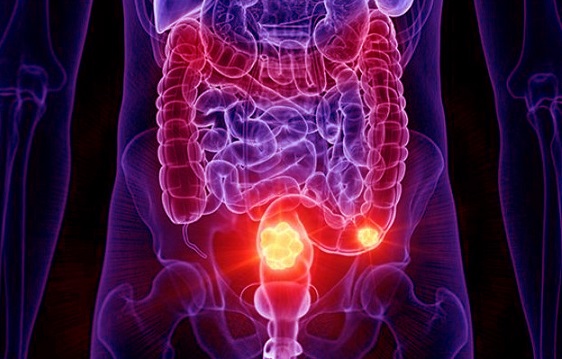Nikhil Prasad Fact checked by:Thailand Medical News Team Jul 13, 2024 9 months, 1 week, 1 day, 17 hours, 39 minutes ago
Colon Cancer News: Colon cancer is a significant health concern worldwide, ranking as one of the most common and deadly cancers. This
Colon Cancer News report explores recent research that has identified a protein, HIPK2 (homeodomain-interacting protein kinase 2), as a crucial factor in the development and treatment response of colon cancer. The findings from this research could pave the way for new diagnostic and therapeutic strategies in the fight against colon cancer.
 HIPK2 protein plays key role in colon cancer progression and therapy
Understanding Colon Cancer
HIPK2 protein plays key role in colon cancer progression and therapy
Understanding Colon Cancer
Colon cancer, also known as colorectal cancer when including rectal cancer, is the third most frequently diagnosed cancer globally and the second leading cause of cancer-related deaths. The survival rate varies significantly depending on the stage at which the cancer is detected, with early detection being crucial for better outcomes. Risk factors for colon cancer include dietary habits, lifestyle, family history, and chronic inflammation.
HIPK2: The Oncosuppressor Protein
HIPK2 is a serine/threonine protein kinase known for its tumor-suppressing properties. It regulates cell growth and apoptosis (programmed cell death), playing a pivotal role in preventing tumor growth. In colon cancer, HIPK2's activation promotes apoptosis, while its inactivation can lead to increased tumorigenicity and resistance to therapies.
The Study's Key Findings
Researchers from the IRCCS Regina Elena National Cancer Institute-Italy, Sapienza University-Italy, and the University “G. D’Annunzio”-Italy conducted an in-depth review of HIPK2's role in colon cancer. They found that HIPK2 interacts with several molecular pathways, including p53, Wnt/β-catenin, and NRF2, all of which are crucial in colon cancer progression and response to treatment.
HIPK2 and p53: A Critical Interaction
The p53 protein is often referred to as the "guardian of the genome" due to its role in regulating the cell cycle and maintaining genomic stability. HIPK2 positively modulates p53, enhancing its ability to induce apoptosis in response to DNA damage. In colon cancer, mutations in the TP53 gene, which encodes p53, are common and are associated with poor response to therapies. The study revealed that HIPK2 depletion leads to the loss of p53 function, resulting in increased tumor growth and resistance to chemotherapy.
Inflammation and HIPK2
Inflammation is a well-known driver of cancer progression. HIPK2 has been shown to regulate inflammatory pathways, including those involving COX-2 and VEGF, which are critical in colon cancer. The study found that HIPK2 inhibits these pathways, thereby suppressing tumor growth and angiogenesis (the formation of new blood vessels that feed tumors). HIPK2's inhibition can lead to a pro-inflammatory environment that supports cancer progression and immune evasion.
HIPK2 and the Tumor Microenvironment
/>
The tumor microenvironment (TME) consists of various cells and molecules that interact with cancer cells, influencing their growth and response to treatment. HIPK2 plays a significant role in modulating the TME. It has been found to inhibit the differentiation of cancer-associated fibroblasts (CAFs), which support tumor growth, and to suppress angiogenesis by targeting endothelial cells.
Implications for Therapy
The study's findings highlight HIPK2's potential as a biomarker for colon cancer progression and response to therapies. High levels of HIPK2 expression correlate with better patient prognosis and improved response to chemotherapy. Conversely, low HIPK2 levels are associated with poor outcomes. These insights suggest that therapies aimed at increasing HIPK2 activity or mimicking its function could enhance the effectiveness of existing treatments.
Future Directions
The researchers emphasized the need for further studies to explore the mechanisms that regulate HIPK2 expression and activity. Understanding these mechanisms could lead to the development of new therapeutic strategies that target HIPK2 and its associated pathways. Additionally, large-scale clinical studies are needed to validate HIPK2 as a reliable biomarker for colon cancer.
Conclusion
This groundbreaking research underscores the importance of HIPK2 in colon cancer. By regulating key molecular pathways and interacting with the tumor microenvironment, HIPK2 plays a crucial role in tumor progression and response to therapies.
The study findings were published in the peer-reviewed journal International Journal of Molecular Sciences.
https://www.mdpi.com/1422-0067/25/14/7678
For the latest
Colon Cancer News, keep on logging to
Thailand Medical News.
Read Also:
https://www.thailandmedical.news/news/herbs-and-phytochemicals-bamboo-leaf-extract-and-colon-cancer
https://www.thailandmedical.news/news/smad4-clue-to-colon-cancer
https://www.thailandmedical.news/news/yoghurt-prevents-adenomas-in-men,-lowering-risk-of-colonic-cancer-
